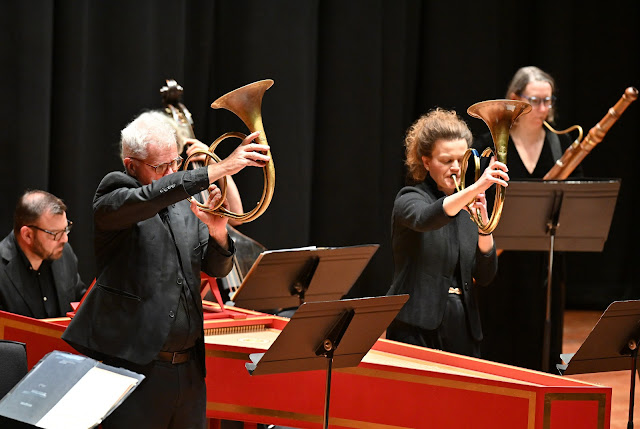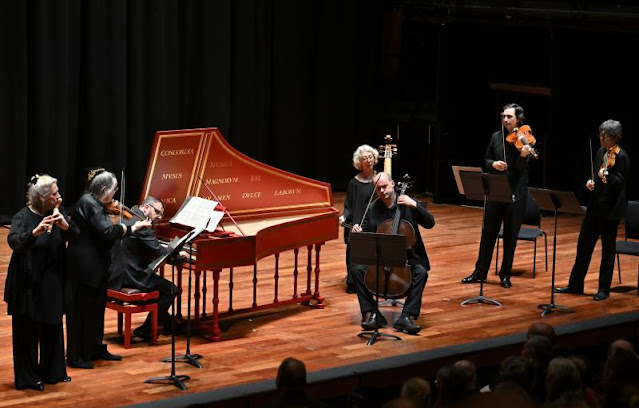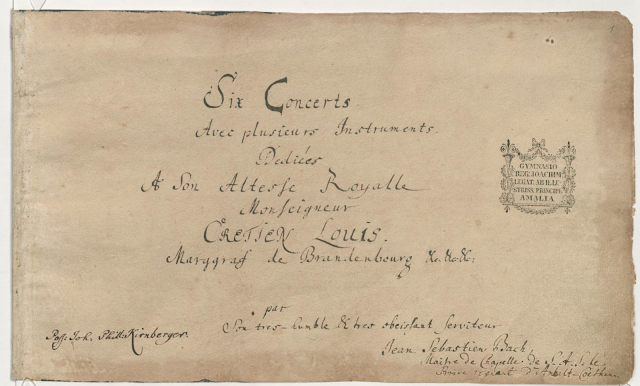Bach: Brandenburg Concertos; Orchestra of the Age of Enlightenment; Queen Elizbeth Hall
Reviewed 13 November 2024
The Brandenburg Concertos complete, vivid, vibrant and sometimes a little raw, the sheer energy, enthusiasm and technical nous really carrying you away
Bach almost certainly never intended his Brandenburg Concertos to be performed en masse, all six at once. In fact, we have no record at all of any performances of the concertos in this form during Bach’s lifetime, his presentation manuscript (see illustration above) for Six Concerts Avec plusieurs instruments simply sat in the Margrave of Brandenburg’s library; so, at least someone regarded the work well enough to look after it.
After all, the various different line ups for the concertos make this rather an extravagant gesture. We don’t really know why this particular set of concertos with these particular scorings, and there remain plenty of questions about the pieces. But in the right performances the music lifts vividly off the page.
This was ample demonstrated by the Orchestra of the Age of Enlightenment‘s (OAE) performances of Bach’s Brandenburg Concertos at the Southbank Centre‘s Queen Elizabeth Hall on 13 November 2024. The 21 musicians performed one to part, without a conductor with violinists Huw Daniel, Margaret Faultess and Rodolfo Richter sharing the directing, with violist Oliver Wilson directing the sixth concerto.
 |
| Bach: Brandenburg Concerto No. 1 – Orchestra of the Age of Enlightenment, Queen Elizabeth Hall |
The Brandenburg Concertos have played an important role in the OAE’s life, ever since the ensemble’s founding (they celebrate 40 years in 2026) and one of the players was actually around for the ensemble’s very first performance of the music!
For the evening’s concert, the concertos were arranged in non-numerical order, creating a nice balance of solo instruments. We began with first concerto, which features the horns, then the third, strings only, then the fifth, with flute, violin and harpsichord. After the interval it was more wind, with the fourth, with two recorders and violin, then strings again with the sixth concerto with its violas, cello and violas da gamba, then we finally returned to brass with the second concerto with its high trumpet part.
The opening movement of the first concerto is almost all about the horns (Ursula Paludan Monberg and Martin Lawrence). How could it not be, with the bells upturned, yet all concerned played with such extraordinary energy that really drew attention away from the horns. Sometimes. It was a vivid and exciting experience. The second movement gave the horn players a well-earned rest and here no-one was to the fore, instead there was a gentle interplay between groups over a throbbing texture. For the third movement, the vigorous horns were back with all concerned giving the music a joyous bounce. The final movement is a minuet with multiple trios, one of which is a Polacca, so we had robust dance contrasting with more graceful interludes and I particularly enjoyed the Polacca, but extraordinary vigour returned at the end. Priceless.
The third concerto is the one I know best because I have actually played it (third viola if you are wondering). The first movement was all infectious energy and individualism, each line having its own character, this was real chamber music and I loved the way the interest passed from player to player. For the mysterious second movement we got Margaret Faultless (violin) and Steven Devine (harpsichord) in another movement by Bach which ended with the two chords from the Brandenburg Concerto. The third movement was fast paced and vivid with tight rhythms and simmering energy.
Next came the fifth concerto, where flute (Lisa Beznosiuk), violin (Margaret Faultless) and harpsichord (Steven Devine) seem to begin with a sort of trio sonata type concerto. It was taken at quite a lick with engaging energy, but then we have the astonishing harpsichord cadenza, with Steven Devine on thrilling form, completely destabilising things. The second movement returned us to the graceful trio sonata, a real one this time, before the joyful dance to end it.
After the interval, it was the turn of the recorders (Rachel Beckett and Catherine Latham) and violin (Huw Daniel) in the fourth concerto. Here we had a lovely contrast between the vivid string rhythms and the liquid tone of the two recorders; throughout Rachel Beckett and Catherine Latham created a lovely sense of unified recorder tone. The second movement was about contrasts, and I loved the sound quality they achieved in the passages without a bass line, just violin and recorders. Then the enthusiasm and enjoyment in the final movement was positively contagious.
The sixth concerto returned us to strings, but in an intriguingly different line up. Two solo violas (Oliver Wilson and Elitsa Bogdanova) over violas da gamba (Richard Tunnicliffe, Kate Conway), cello (Andreew Skidmore) and bass (Cecelia Brugggemeyer), a piece of complete sonic magic. The role of cello and gambas was simply to throb, whilst the two violas created a busy, warm sound and I loved how the two players, seemed to relish the bouncing of ideas between them. The second movement was pure trio sonata, the violas elegant, elaborate and plangent, whilst the final movement was infectious fun.
We ended as we had started, with the brass in the second concerto. This time David Blackadder had the task of playing the high trumpet part (it has to be high in order for him to be able to have a range of notes, no valves and no hand-stopping available here). Blackadder was brilliant, producing a clear, elegant sound that balanced wonderfully with oboe (Clara Espinosa Encinas), recorder (Rachel Beckett) and violin (Rodolfo Richter). The slow movement gave Blackadder a rest as the other three gracefully wound lines around each other, then the trumpet returned, really meaning business in a finale full of impetus.
 |
| Bach: Brandenburg Concerto No. 5 – Orchestra of the Age of Enlightenment, Queen Elizabeth Hall |
The whole evening sped by, partly because every movement, every note was invested with a sense of infectious enthusiasm and clear ownership. This wasn’t an over-blended orchestral sound, it was vivid, vibrant and sometimes a little raw, the sheer energy, enthusiasm and technical nous really carrying you away.
The blog is free, but I’d be delighted if you were to show your appreciation by buying me a coffee.
Elsewhere on this blog
- By some strange piece of magic, it works: Dancing Queen from Asya Fateyeva & Lautten Compagney Berlin mixes Rameau with the songs of ABBA – record review
- Colour, movement and tradition: Juan Diego Florez in Offenbach’s The Tales of Hoffmann at Covent Garden – opera review
- Powerful intensity, youthful vigour: Benjamin Hulett & Helen Charlston in Handel’s Jephtha at in Wimbledon – concert review
- Much more than a guilty pleasure: the songs of Reynaldo Hahn at the London Song Festival – concert review
- The sound of wind, sunlight or water: pianist Anna Tsybuleva on her new recording of Debussy’s Préludes on Signum Classics – interview
- A bright beginning: Three Sonatas reveals the distinctive voice of young composer Sam Rudd-Jones in chamber music that intrigues – record review
- Provoking the inner senses: Mendelssohn’s Elijah in the majestic surroundings of King’s College Chapel, Cambridge – concert review
- Gentle Flame: Liz Dilnot Johnson’s diverse output showcased in this disc celebrating her relationship with Ex Cathedra – record review
- Forging ahead: Specializing in the performance of Wagner operas, the London Opera Company in Siegfried – opera review
- A terrific achievement: professionals & amateurs come together at Sheffield’s Crucible Theatre performing Jonathan Dove’s The Monster in the Maze in celebration of Music in the Round at 40 – opera review
- Home






%20Craig%20Fuller.jpg?w=160&resize=160,160&ssl=1)



